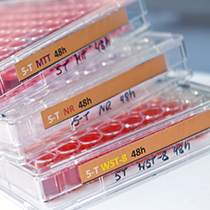Cell culture bioassays - practical training
|
Cell-based bio-assays are complex as they are influenced by to whole variety of factors and cells a viable part of the assays change with time and react to changes. Optimal and reproducible results may depend on the culture conditions of the stock culture or the assay culture. They are influenced by counting errors and pipetting, the choice of media and cell culture plastic and the effect of these may vary with the choice of assays. Differences also arise from variation introduced by the personnel or non-standardized technical parts of the protocols. This usually 3 day training will help you establish and optimize your cell culture bio-assays faster and avoid common mistakes and set-backs. It is addressed to the personnel who already perform cell based assays as well as to new group members. The hands-on parts are tailored to troubleshoot current protocols and identify fields for optimization or validation. |
 |
Topics of the theoretical seminars
- Quality: definition and understanding
- Risk analysis as a basis for decisions
- Bio-assay Troubleshooting: define sources of variation and deviation
- Cell cycle and cellular decisions
- Cells. Choice, identity, contamination
- Cell Banking
- Plastic ware: surfaces, leachables, homogeneity, assay influence
- Media: quality, storage, handling, pH, assay influence
- FCS: necessity and batch variations, storage, assay influence
- Incubator: consistency, cleaning, control
- Pipettes: precision, choice, sheer forces
- Routine methods: standardization where and when
- Establishing and optimizing a bio-assay
- Troubleshooting of bio-assays
- Discussion and interpretation of the results from the practical part
Topics of the practical training
- Tips for cell microscopy
- Performance of a Cristal Violet assay
- Performance of a WST-8 assay (or MTT or Neutral Red if preferred)
- Pipette test
- Troubleshooting and feed-back during the lab sessions
Frequently combined further topics for in-house courses
This content is adapted, supplemented and shortened for in-house courses according to requirements and customer wishes. Depending on the content, group sizes and available sterile workbenches, the course can be designed between 1 and 4 days long. All content is customized. Additional topics could include:
- Mycoplasma and mycoplasma test kits
- Cross contamination
- Hygiene relevant equipment (e.g. sterile bench, incubator) and their selection, cleaning and testing
- SOP workshop: aseptic working technique
- Cell counting and counters
- Standardization
- Continous process control
- Bioassays
- Aseptic technique
- Contamination (incl. Mycoplasma or viruses)
- Transfection basics
- GMP basics
Duration
2,5 to 3 days.
Target Group
Technical and scientific staff members with cell culture experience and bio-assay experience. If newcomers are to be trained, the course can be changed such that additional cell culture basics are included.
Dates and pricing
Please contact us for an offer tailored to your needs. All dates are set to suit your schedule. Usually a course can be performed as fast as 4-8 weeks after the initial contact. Depending on the level of your group, topics can also be added or removed to better fit the training necessities. Our contact details are found here.
Teacher
|
Dr. Nicole Kühl studied Biology at the Technical University of Karlsruhe and the University of Bremen. 1999 she completed her Ph.D. in cell and molecular biology studying the cell cycle and heat shock proteins. Dr. Kühl then began her post-doctorate work at the Academic Hospital Groningen in the Netherlands, where she specialized in research related to multiple sclerosis and worked with primary glial cells. In 2005, she continued her work at the Jacobs University Bremen, where she led a research group and lectured in biochemistry and cell biology. From 2008 to 2011, Dr. Kühl was the head of the PromoCell Academy and taught cell culture as well as quality assurance and GMP courses. Since 2012, she is a freelance trainer and consultant in the area of cell culture quality assurance and GMP and runs the cell culture web site InCelligence.de. Watch Dr. Kühl in a video from our MOOC. Dr. Kühl also works as a consultant for manufacturers of e.g. incubators, cell culture plastic consumables, cell counter and analyzers. Since 2016 Dr. Kühl acts as an external head of quality assurance for ANOVA IRM GmbH. There she acquired two legal permissions from the German regulatory bodies, one for a tissue preparation and one for an ATMP. |
 |


